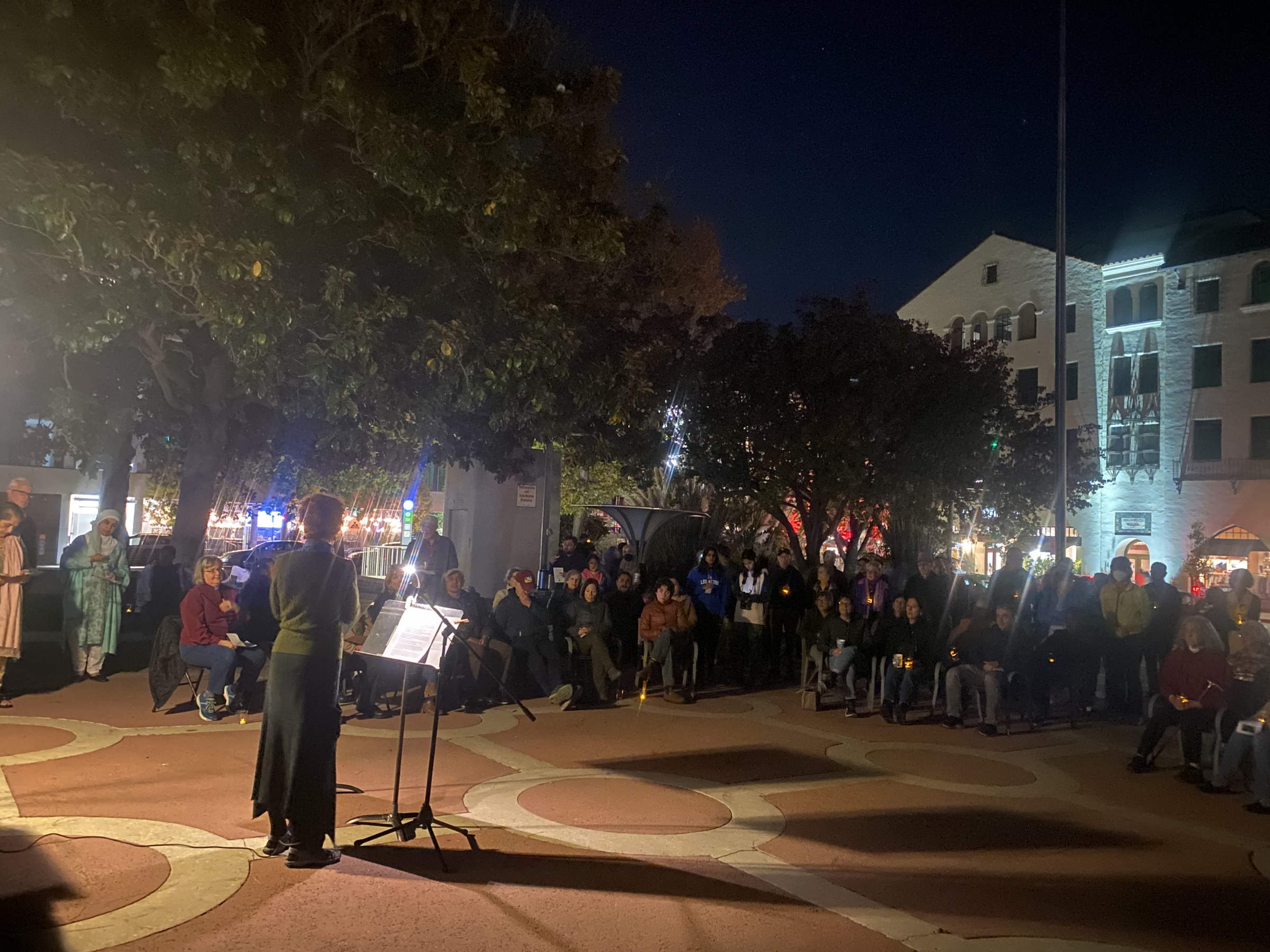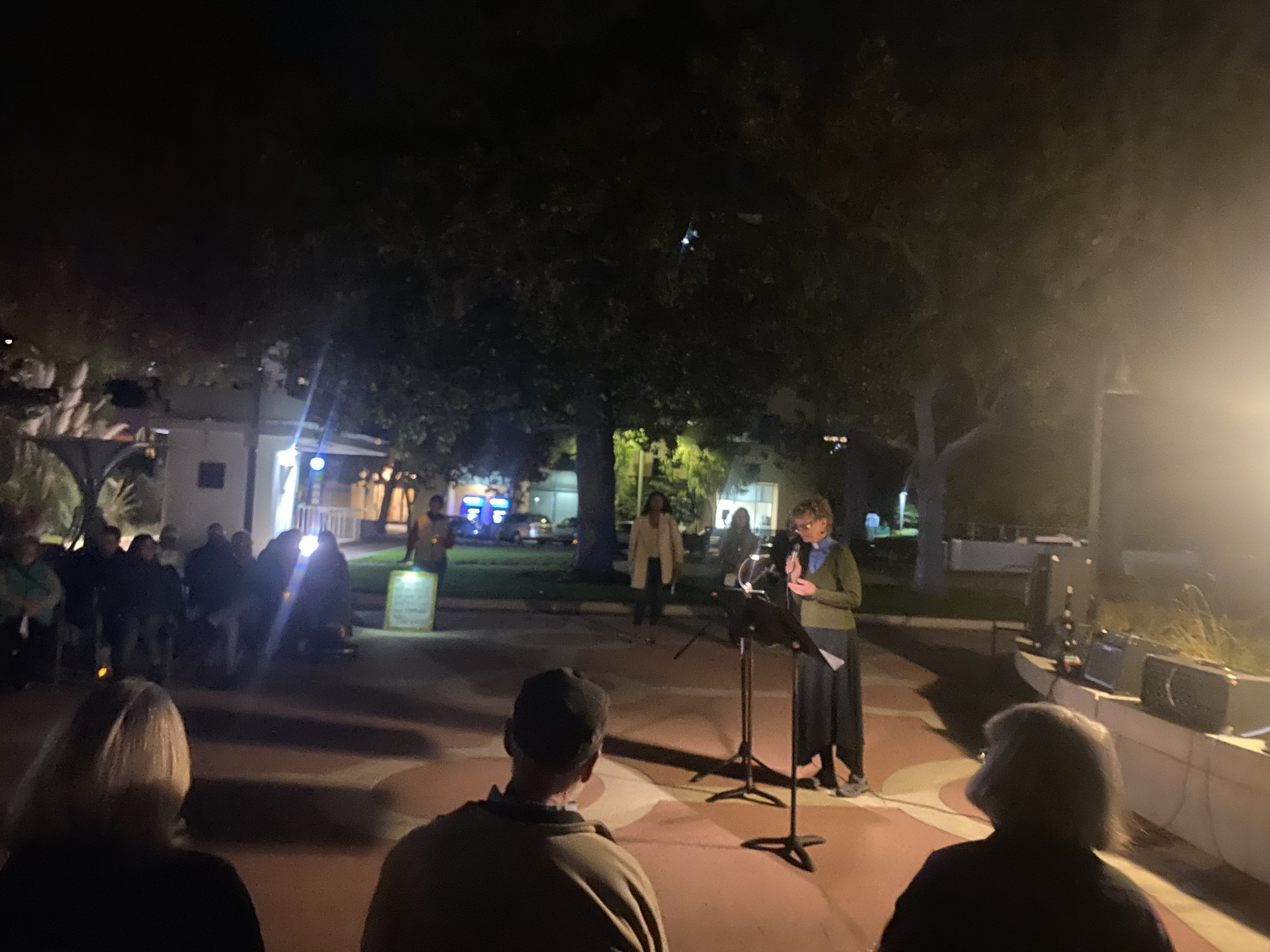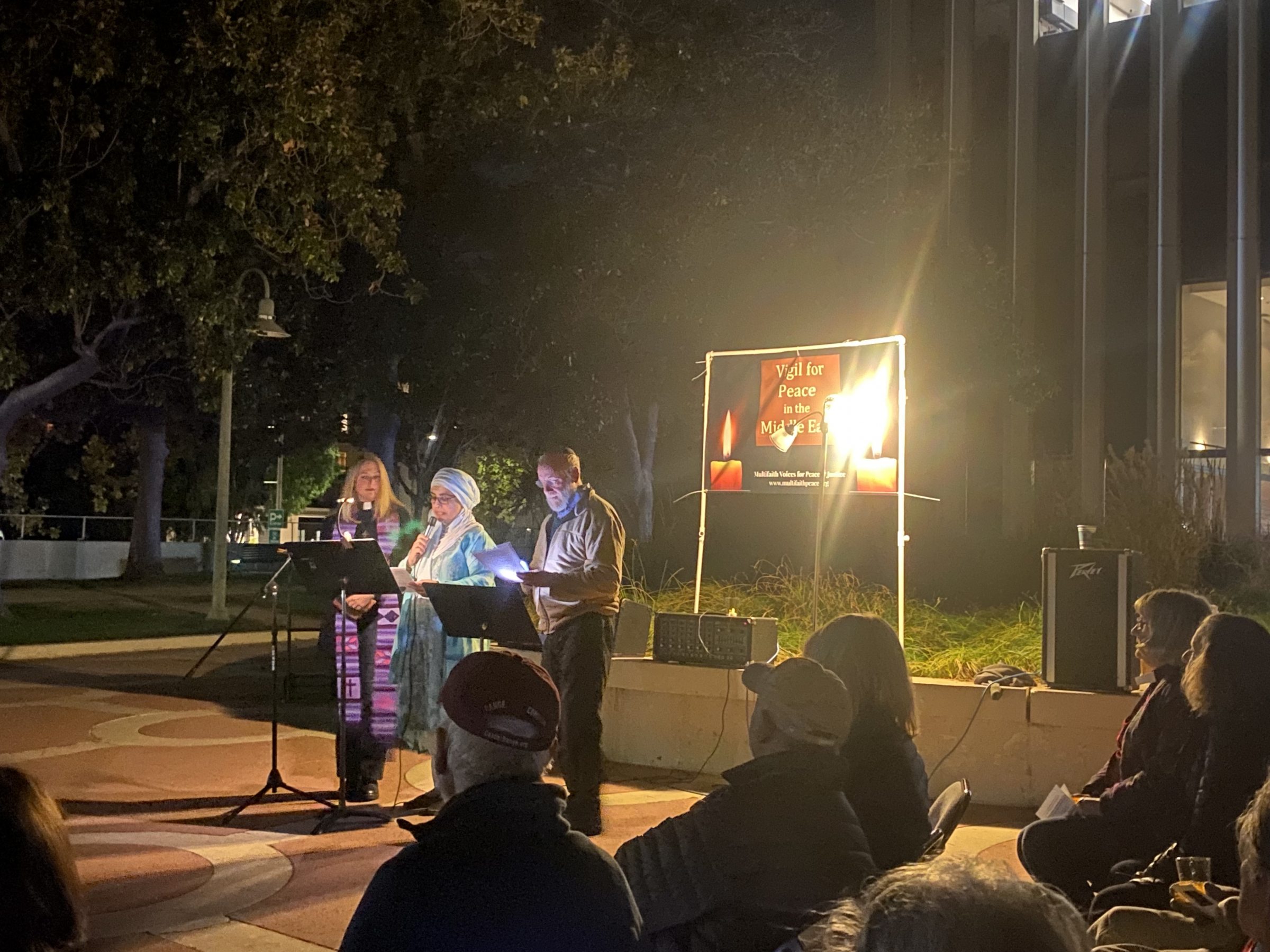The solemn demonstration that took place in front of Palo Alto City Hall on Saturday night was almost as striking for what wasn't there as for what was.
There were no political signs or chants. No calls to support Israel or to denounce Hamas. No voices of support for Palestinian independence and no diatribes against Israeli occupation. No arguments for a ceasefire.
The only poster that was prominently displayed at the Nov. 11 event was one announcing the name of the event: Vigil for Peace. And for the group Multifaith Voices for Peace & Justice, which organized the rally, that was the point.
The vigil, which featured songs, prayers, tears, hugs and moments of silence, brought about 150 people to King Plaza. The messages in their songs and prayers were purposefully vague, multi-cultural and universal. Louis' Armstrong's "It's a Wonderful World." Emma Revolution's "Peace Salaam Shalom." A recital of "Prayer for mothers for life and peace," which was written by Sheikha Ibtisam Mahameed and Rabbi Tamar Elad-Applebaum.
The Saturday event almost didn't happen. While Multifaith Voices for Peace & Justice prides itself on inclusiveness, event organizers acknowledged the difficulty of coming up with the right words to say during times of high divisiveness and trauma.
The Rev. Eileen Altman, who serves on the organization's Prayer Committee, said the tension within the group's ranks has been similar to the tension within the wider community. Some members feel like there hasn't been enough sympathy for the devastation that happened in Israel on Oct. 7. Others feel like Israel's subsequent military actions in Gaza and attacks by Israeli settlers in the West Bank haven't been given enough attention, Altman said in an interview.
Despite the difficulty in coming up with a unified message, the group felt it's important to rally and bear witness to the current moment, she said. Since the Oct. 7 terrorist attack, members of the multi-faith group have been in "excruciating pain together," she said.
"We've grieved together, we've wondered what we might bear witness to during this very difficult time," said Altman, associate pastor at First Congregational Church in Palo Alto. "We felt it was important to bear witness for peace in the midst of this violence, as we have for other wars. But we also struggled with what to say.
"We felt like, even if we don't quite know what to say yet, we know we want to pray together for peace. We want to sing together, we want to pray together. We want to be together."
The multi-faith group was born in the aftermath of 9/11 and the ensuing war in Iraq. In 2003, members of various Midpeninsula congregations started holding monthly meetings, which take place on the 11th of each month as a commemoration of the group's origin. Today, the group lists as its participants 17 congregations and religious organizations, a roster that includes Trinity Church in Menlo Park, American Muslim Voice, Mountain View Buddhist Temple, St. Thomas Episcopal Church in Palo Alto, and Beyt Tekkun in Berkeley.
Altman said that since the group's founding two decades ago, no issue has been as divisive and complex as Israel and Palestine. That, she said, is a reflection of the fact members of the group come from different places and, as such, have different views and positions.
Diana Gibson, convener for Multifaith Voices for Peace and Justice, told the assembled crowd that the group made a conscious decision to keep politics out of the event to create a "safe space" for everyone to pray together. For organizers, this meant banning signs and cancelling speakers, Gibson said.
The organization considered not doing anything at all but decided that this was not an option, Gibson said.
"For while it is a vigil for peace in the Middle East, we also desperately need peace here and now," Gibson said. "The wounds are deep here and, tragically, as we all know, the violence and hatred have struck here as well. We could not be silent. That said, words can cause unintended pain."
Sumina Sundas, one of the founders of Multifaith Voices for Peace & Justice, acknowledged the difficulty of showing restraint and avoiding politics altogether during the present time.
Sundas said in an interview she strongly supports a ceasefire in Israel and believes the situation will only get worse if things remain on the current trajectory. But she also noted that some of her Jewish colleagues are offended by that position. Her comments at the vigil avoided any mention of a ceasefire.
"All of us are walking on eggshells and the only reason we're surviving is because of having these long-term relationships," Sundas said after the event.
If anything, the recent conflict has only reinforced the importance of the multi-faith group and the relationships that its members had forged over the past two decades, she said.
"We are honest and we care about each other," Sundas said. "We have rabbis in the group and I deeply care about them because they're building friendships. … The reason we can do this particular work today is because we have relationships."
These ties were on display Saturday, as leaders from three different faiths – Jewish, Christian and Muslim – came together to recite "Prayer of Mothers for Life and Peace" in English, Arabic and Hebrew. At the conclusion of the vigil, all attendees stood in a circle to jointly recite a prayer for peace.
One of the goals of the event, Sundas said, is to encourage residents of different faiths and backgrounds to get to know one another. All religions, she noted, encourage their followers to love their neighbors.
"But the thing is, how do we love our neighbors if we don't even know them?" she said. "So my request to my fellow Americans would be: Please get to know your neighbors. Get to know everybody. Because the only way this can subside -- this war and violence -- is if we see each other and see our humanity."





Comments